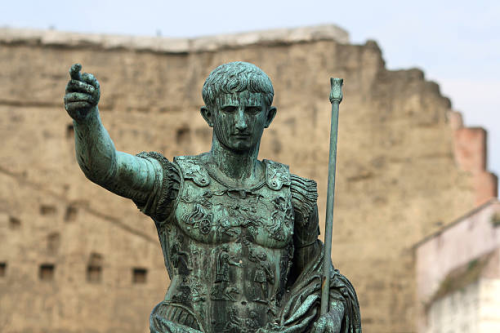Jesus and Caesar
- aaronglogan
- Sep 30, 2018
- 3 min read
Updated: Oct 17, 2018

Christians often tend to think that understanding “context” where the Bible is concerned means reading the verse before and the verse after. Or maybe the whole chapter if they want to get really radical. lol But to truly understand context you also have to study the history and culture of the time and place. (A great way to do this is by studying scholars and study bibles with notes and essays from scholars, since this is what they do.)
Here’s an example: What did “son of god” and “savior of the world” mean in the Roman Empire in the 1st century?? Believe it or not, these terms were already in use before Jesus came on the scene. To call a god one’s father was a familiar motif in the Greco-Roman world. Divine births fill Greek and Roman mythologies. However, there is one in particular that would have been the most familiar to people living in the Roman Empire in the 1st century…..Caesar.
Julius Caesar was said to have ascended to the heavens and become one of the gods after his death. Caesar Augustus, the successor and adopted son of Julius, was said to be the son of Apollo. A god for a father, and a human for a mother. He was also called “savior of the world” for bringing peace to the Roman Empire through military conquest. Even the Roman coins had a picture of him with the inscription: CAESAR DIVI F - translated: "Caesar, son of the divine". To call Jesus “Lord”, “son of God”, and “savior of the world” was to use familiar language, as these terms were already applied to Caesar.
"The title divus Julius (divine Julius) assumed by Julius Caesar was a formal title of divinity. The odiousness of this claim led directly to his discomfiture. Caligula's claim to be a god struck his contemporaries as evidence of instability. The title divi filius (son of the divine) by which Augustus was worshiped during his lifetime was not a formal title of divinity. It was not until after his death that he was a corded celestes honores (celestial honors). Nonetheless, honors came his way. By 36 BC Italian cities had begun to grant him a place in their temples, acknowledging that he was worthy of worship. Beginning in 30 BC his birthday was declared a public holiday, and various forms of worship (pouring of libations, public honoring of Augustus at meals) began to take place. In 29 BC he granted permission for temples to be dedicated to divine Julius and Roma at Nicaea and Ephesus, and temples dedicated to Roma and Augustus at Nicomedia and Pergamum. That same year his name was included in the list of the names of the gods in various hymns. In 27 BC his genius was linked with the name of Jupiter and di Penates." (David Nystrom. See final resource below.)
Some scholars have taken a strong anti-imperial approach to the NT.....that the early Christians were in essence saying, "Jesus is Lord, and Caesar is NOT." That the Christian movement was essentially an anti-empire, anti-Caesar, and anti-Imperial Cult movement. Other scholars have pulled back from that a little, with more of a view that the early Christians may not have been strongly anti-Caesar or anti-empire, but were simply claiming that Jesus and the Kingdom of God were above it all. In either case, understanding how these terms were already in use provides some context.
Some resources:
Quotes from many scholars and historians:
http://jesushistoryproject.com/son-of-god/
Roman coins in the time of Augustus
http://academic.brooklyn.cuny.edu/classic/wilson/coin/showme.htm
Video: Jesus & Caesar by John Dominic Cross (scholar)
https://www.youtube.com/watch?v=8Axx5Vx0j8A
Book: Jesus Is Lord, Caesar Is Not https://amzn.to/2OQf2GU




Comments